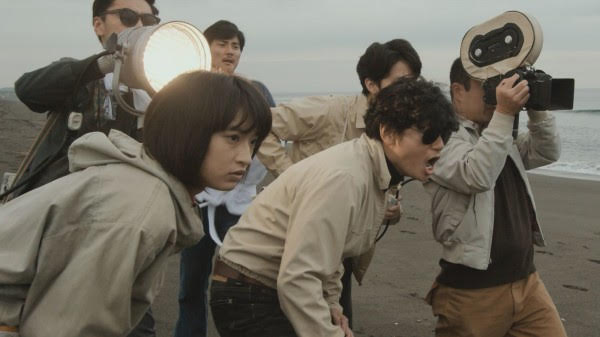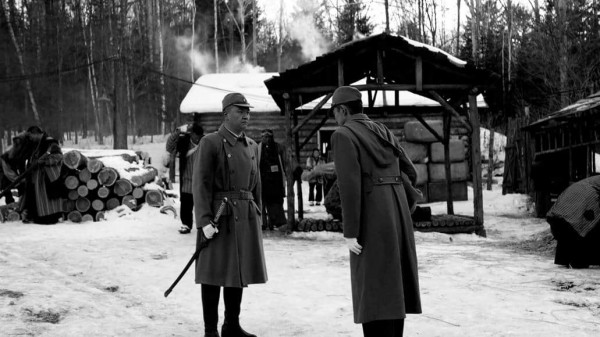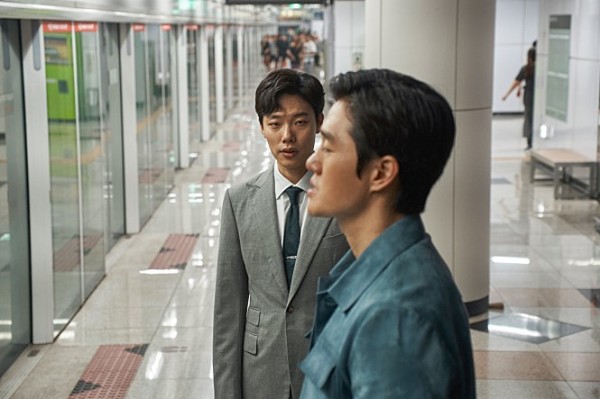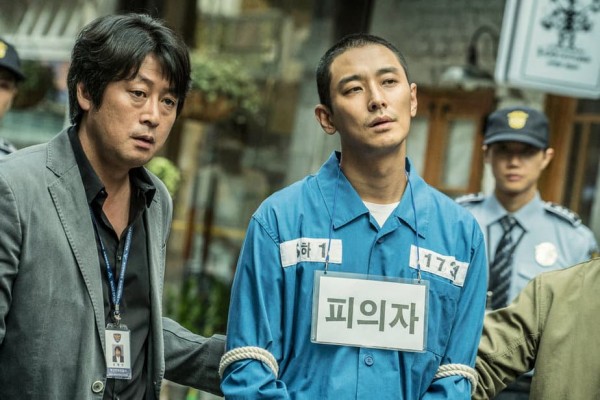-
DARE TO STOP US 止められるか、俺たちを, (Kazuya Shiraishi 2018)
KAZUYA SHIRAISHI: DARE TO STOP US 止められるか、俺たちを(2018)

WAKAMATSU'S CREW AT WORK IN DARE TO STOP US; MEGUMI (MUGI KADAWAKI), LEFT
A radical Japanese movie company
Kōji Wakamatsu was a provocative Japanese film director who defies classification. He had been in the yakuza, and even as a filmmaker, gave free rein to an aggressive, provocative personality. His cinematic production ranged from softcore porn pinku eiga films like Ecstasy of the Angels and Go, Go, Second Time Virgin to films about revolution and the radical Palestinian PFLP. He also produced Nagisa Ōshima's famous shocker of radical sexuality In the Realm of the Senses. The porn ones themselves incorporated radical politics and radical aesthetics with the exploitation. This film about Wakamatsu, some of his key associates, and a young woman, struggles to convey this mixture which, for an American, may be hard to imagine, though there is a funky charm about the group dynamic.
The Sixties and Seventies were the most fertile period of Wakamatsu Productions, founded by revolutionary auteur Koji Wakamatsu (Caterpillar) and staffed (for free) with radical young artists like avant-garde filmmaker Masao Adachi, cinematographer Hideo Ito, and scriptwriter Arai (Kisetsu Fujiwara). Kazuya Shiraishi (The Blood of Wolves) himself got started making exploitation pictures at the company, now presents this raucous but fact-based account of one young dreamer Megumi (Mugi Kadowaki), who joins Wakamatsu in the spring of 1969 to make pinku eiga. She is somewhat at a loss, but sticks with whatever happens, except that she can't join in the company's radical political action. As she struggles to fit into the testosterone-heavy "family" and find her own voice, Megumi’s life becomes equal parts masculine and feminine, and over time, heroic and tragic. After she becomes pregnant by the company's still photographer Takama (Ku Ijima), Megumi's psychological instability and painful family background come forward.
One early Wakamatsu pinku eiga was Taiji ga mitsuryo suru toki ("The Embryo Hunts in Secret," 1966), in which a woman is sexually enslaved by her boss, and the 1969 Yuke yuke nidome no shojo ("Go, Go Second Time Virgin"), featured in this film. Wakamatsu co-directed, with Masao Adachi, a 1971 documentary about the People's Front for the Liberation of Palestine. His later films included the docudrama Jitsuroku Rengo Sekigun: Asama sanso e no michi (2007; United Red Army), which was screened at the Berlin International Film Festival and the Tokyo International Film Festival; Kyatapira ("Caterpillar," 2010), nominated for a Golden Bear at Berlin; and 11.25 jiketsu no hi : Mishima Yukio to wakamono-tachi (2012; 11.25: The Day He Chose His Own Fate), a biography of novelist Yukio Mishima shown at Cannes (referred to in this film), and Sennen no yuraku ("Millennial Rapture"), premiered at the Venice in 2012. Wakamatsu was named Asian Filmmaker of the Year at Busan in 2012.
At the time of his death in a traffic accident at 76 Wakamatsu was returning from a meeting for his latest project, focused on Japan's nuclear industry lobby and the Tokyo-based TEPCO company. The topical subject matter followed on the heels of the Fukushima nuclear disaster.
There's a discussion of Shraishi's film by Mark Shilling in The Japan Times (October 2018). Shilling met Wakamatsu several times and says "He was feisty and outspoken, but his sense of mission also struck me. He saw himself as a truth-telling guerrilla in a business, society and world dedicated to peddling convenient lies."
Dare to Stop Us is a movie about a group, and about intense working friendships, bull sessions, getting drunk together, and a lot of cigarette smoking. It's about personalities hanging out. They're presented jokily at first, but as the enterprise gains credibility, are seen in a more serious light. There's an old-shoe quality about many of the scenes that is very appealing. The main characters, even the brusque Wakamatsu himself (Arata Iura), come forward and become attractive, not only Arai (Kisetsu Fujiwara) and Megumi (Mugi Kadawaki) but the soulful Takima (Ku Ijima), who winds up as Megumi's bed partner, and various others. Nonetheless something may be lost in the subtitles in this largely understated and unclassifiale film. Shiraishi is trying to catch lightening in a bottle. How well he captures it may elude the non-native viewer.
Dare to Stop Us 止められるか、俺たちを, 119 mins., debuted in Japan Oct. 13, 2018 after an Oct. 5 premiere at Busan. It has been in at least five other film festivals including the NYAFF, where it was screened for this review.
NYAFF showtime:
Showtimes
Thursday, July 4
3:00 PM
Last edited by Chris Knipp; 06-29-2019 at 04:52 PM.
-
WALK WITH ME 雙魂 (Ryon Lee 2019)
RYON LEE: WALK WITH ME 雙魂 (2019)

MICHELLE WAI IN WALK WITH ME
The horror of domestic life and a shitty job
The "legendary" and much-awarded Malaysian screenwriter Ryon Lee comes up with his seventh combined directorial and writing effort and his fourth horror film, his last credit having been Haunted Road 2. He pulls out all the stops here, though that doesn't mean special effects, of which there are hardly any. The cinematography is subtly colorful, with yellows, turquoise and light greens predominating. If the sing-song Cantonese dialogue (I guess) and yammering arguments are grating, one can always shut one's ears and look at the pretty pictures.
It's not any F/X but the varieties of spookiness wrecked quietly down upon Sam (Michelle Wai, aka Wei Shiya), the young female protagonist that are numerous. Interestingly, she is repeatedly threatened with rape or sexual menace from nearby men. But she just seems to live in a scary world. She is bespectacled, shy, and cute. She works in a garment factory, where the older, more experienced women workers don't like her. The manager bullies her, as does her father (Wu Yaohan) at home. Then he disappears.
Sam has recourse to a raggedy doll that may embody he spirit of her lost little brother, and may also be a vehicle of revenge. These are people who believe in ghosts, spirits that possess and haunt. Very early on, the young woman and her mother, with a group of neighborhood women, come upon a man changing over and manipulating an older woman he is apparently freeing of possession.
Randomly (in this film's rather vague sense of space) out of nowhere a young man, York (Alex Lam, aka Linde), appears, a friend ten years before when they were kids, now chubby no more but lithe, full grown, and attractive, and he rents the spare room and becomes part of the household. It is not clear to me whether Sam's mother (Wu Yiyi), known only as "Ma," is a spook or a friend. She is "just a clinic assistant" and constantly querulous, and sometimes seems afraid, at others angry and menacing. Is the young man friend or foe? And is this uncertainty an intentional ambiguity, or tonal clumsiness? Early on we see the girls's mother and father fighting? Is this menace too, the horror of domestic unrest? Or just atmosphere? Or are they possessed by the evil sports of the unquiet dead? Up on the roof with the laundry hanging on the line, York tells Sam he doesn't care about ghosts and will protect her from them. But he says "To defeat the darkness, you must become part of the darkness," which sounds spooky.
Later, while Ma and Sam are acting hysterical over ghosts - arguing over whether the doll contains the ghost of Sam's dead little brother - York uncovers a cistern and finds her perpetually disappearing dad floating in it. Who is responsible for Sam's dad's death? Is the spirit of her dead brother Dao Dao in the doll invading Ma's mind and making her crazy? Did Sam's boss Tham Kok Wai rape her as the doll tells Ma? One sequence of growing menace or suspicion is cunningly intercut with images of York dicing vegetables for a dinner he's preparing for the vegetarians, Ma and Sam, the chop-chop and the rising music almost worthy of Hitchcock. Lee makes an admirably efficient use of available scene for his chilling effects; a sewing machine becomes a fatal torture device - and it is all done subtly, without gore. The melodrama is excessive throughout, but there is an odd restraint which, with the lovely blues and greens, makes this an interesting experience.
Walk With Me 雙魂 (Shuāng hún, "Double Soul"), 92 mins., got its North American premiere in the NYAFF, where it was screened for this review. It reportedly was exported before its domestic release. Facebook page. This has some Hong Kong actors in the leads and I believe was shot in Hong Kong.
Last edited by Chris Knipp; 07-02-2019 at 02:02 PM.
-
WINTER AFTER WINTER (Xing Jian 2019)
XING JIAN: WINTER AFTER WINTER (2019)

AN EXTERIOR SCENE FROM WINER AFTER WINTER
Elephants sitting still?
Xing Jiang reportedly debuted with an austere self-financed film about an old man at the top of a mountain in winter. Things have hardly become less chilly or austere here in this sophomore effort, funded somewhat inexplicably by the tech conglomerate Alibaba. It is in wide screen "high-contrast monochrome" (I'll be relying as here on Clarence Tsui's Hollywood Reporter review), so the look itself is elegantly chilly. It focuses on a Chinese family in Manchuria headed by Lao Si (Gao Qiang).
It's the end of the War, 1944, and the Japanese are desperately trying to avoid the fact that their empire is crumbling, and are about to take Lao Si's three son's away to hard labor camps. The local Japanese commander (Hibino Akira) is at Lao Si's house to claim the sons. The old man is desperate to maintain his family line. He wants his young daughter-in-law to be impregnated, and since her husband (Dong Lianghai) is impotent, he gets the marriage annulled so one of the younger sons can step in and do the job.
The second son Lao Er (Yuan Liguo) decides to flee the house to join the guerrillas instead. The timid youngest son Lao San (Liu Di) tries to do what his father wants but fails before they are taken away. Things get more complicated when later Lao San escapes labor camp and is nursed back to health by the long-suffering, mostly silent wife Kun (Yan Bingyan. In the closeness of her nursing Lao San back to health, he does get her pregnant. Then Lao Er reappears and nearly kills Kun "out of jealousy and disgust" at this event. After Kun is pregnant, Lao Si arrabged a quick cover marriage between her and the mentally handicapped son of the village elder statesman.
All of this is grim but also not without its comic side. The use of long takes, the austere style, lengthily focused on menial tasks by Kun in the grubby, dark, unheated interiors of Lao Si's farmstead, and the stoical behavior make this a prime example of slow cinema. One early scene where a man and a woman, heavily bundled up against the cold, sit and stare mutely at each other for at least five minutes, almost lost me.
Tsui points out this film is represented by Rediance and that it is the Beijing outfit that "helped bring Cai Chengjie's black-and-white supernatural satire The Widowed Witch (a.k.a.Shaman) and Hu Bo's soul-shattering An Elephant Sitting Still to international prominence last year." They may not have quite that kind of luck this time.
Also reviewed at Rotterdam by Wendy Ide for Screen Daily.
Winter After Winter('Dong Qu Dong You Lai'), 110 mins., debuted at Rotterdam, showing in at least five other international festivals. It was screened for this review as part of the NYAFF.
NYAFF showtime:
Friday, July 5
3:00 PM
Last edited by Chris Knipp; 06-29-2019 at 11:57 PM.
-
SEE YOU TOMORROW 擺渡人 (Zhang Jiajia 2016)
ZHANG JIAJIA: SEE YOU TOMORROW 擺渡人 (2016)

TONY CHIU-WAI LEUNG AND TAKESHI KANESHIRO IN SEE YOU TOMORROW
[IMDb:]
The story follows Chen Mo (Tony Chiu-Wai Leung), the bar owner and 'ferryman', as he is slowly facing his own traumatic past, whilst helping the people around him, including his co-partner Guan Chun (Takeshi Kaneshiro), the singer Ma Li (Eason Chan) and the neighbor Xiao Yu (Angelababy).
[Wikipedia:]
See You Tomorrow (Chinese: 擺渡人) is a 2016 Chinese-Hong Kong romantic comedy film directed by Chinese writer Zhang Jiajia in his directorial debut and produced and written by Wong Kar-wai with Alibaba Pictures.[5][6][7] It is based loosely on Zhang's own best-selling book Passing From Your World in the collection I Belonged to You.[8] It stars Tony Leung Chiu-wai, Takeshi Kaneshiro and Angelababy.[3] Filming started in July 2015.[9] It was released in China by Alibaba Pictures on December 23 , 2016.[10].
No full-length review will be available of this film at the moment.
Last edited by Chris Knipp; 06-29-2019 at 01:50 PM.
-
MONEY 돈 (Park Noo-ri 2019)
PARK NOO-RI: MONEY 돈 (2019)

RYU JEON-YEOL AND YOO JI-TAE IN MONEY
Temptation
Money is a deliciously fresh, and a little raw, depiction of fast and shifty stock brokering and white collar high crimes and misdemeanors from Korea. Director Park Noo-ri has made a stunning feature debut, and Ryu Jeon-yeol's electric, nimble performance in the lead shows why he's a rising star.
As a new take on Oliver Stone's Wall Street from Korea, this movie ramps up the action to physical and high crime in the second half. While close to the Wall Street trajectory, its glossy big spender trappings make one think more of Scorsese's later The Wolf of. . . But everything is updated further here, and a smoothness with the latest technology. Money is already attracting interest in various quarters. There is a lengthy-ish piece on it in Cinema Escapist.
When fledgling broker Cho Il-hyun (Ryu Jun-yeol) comes to work selling stocks at Yeouido, Seoul's financial district, they call him Raspberry because his parents have a raspberry farm. He's fresh, energetic, and ready but very green. The early tipping point comes when Choi can't understand a rapidly mumbled phone order - but won't admit it - and, guessing wrong, loses a client fifty thousand dollars by buying when he was supposed to sell. This draws the attention of devious and shadowy fund manager Ticket (Yoo Ji-tae, Oldboy) who starts feeding him illicit insider deals using thumb drives that he throws in the river when the lucrative deal is done. His first such deal is a $50 million trade that nets Cho $1.4 million, instantly delivering him a whole new lifestyle and a whole new outlook. He ditches his old girlfriend for Park Si-eun (Won Jin-ah), a slick babe who's a fellow broker and introduces him to bespoke suits and other posh accoutrements. Cho steps forward from another young, handsome broker who's to the manner born, but isn't doing so much himself.
Cho is being tracked by an insidious and persistent investigator at Korea’s securities regulator - the sticky, troublesome Han Ji-chul (Jo Woo-jin), who repeatedly feeds Cho photos of himself in compromising situations, seemingf as much blackmailer as a law officer. Ticket urges Cho to act confident and says Han's creepy sub rosa snooping only shows his organization hasn't got a solid case.
As Richard Yu points out in his discussion of Money in the new global (and Asian-focused) online review Cinema Escapist, Cho hasn't the heft or even the interest as a character of the now iconic Gordon "Greed is good" Gekko memorably played by Michael Douglas. For all his energy, Cho seems barely more than a schoolboy compared to some of the brawny, driven financial manipulators in American Wall Street movies.
But we must bear in mind that Money is conceived throughout more as a slow-burn crime thriller, and, as Yu acknowledges, is still ultimately thrilling and fun to watch, without the big speeches or hefty characters but with good actors, a nifty script, and an elegant score.
At the public screening there will be a Q&A with director Park Noo-ri and lead actor Ryu Jun-yeol, and the latter will receive the Screen International Rising Star Asia Award.
Money 돈 (Don), 115 mins., released in South Korea and the US in March 2019. Also released in Taiwan, Vietnam, Singapore and Hong Kong. Screened for this review as part of the NYAFF. Billed as the New York Premiere, but according to an online review in J.B. Spins, it opened in Queens and New Jersey May 29.
NYAFF showtime:
Showtimes
July 6
6:00 PM
This will become available on streaming in the Us via Amazon Prime or Netflix in future.
Last edited by Chris Knipp; 06-30-2019 at 10:52 PM.
-
DARK FIGURE OF CRIME 암수살인 (Kim Tae-kyun 2018)
KIM TAE-KYUN: DARK FIGURE OF CRIME 암수살인 (2018)

KIM YOON-SEOK, JU JI-HOON IN DARK FIGURE OF CRIME
The crazy killer and the dedicated investigator
This is a police procedural with a difference. The term "dark figure of crime" alludes to the mass of unsolved crimes, particularly murders, that continually accumulates. On the one hand it's the story of the fierce psychological confrontation between a detective, chief inspector Kim Hyung-min (Kim Yoon-seok) and a multiple killer, Kang Tae-oh (Ju Ji-hoon, and the lengthy teasing cat and mouse game as this plays out. On the other hand it the story of inspector Kim's extraordinary dedication to solving a series of unsolved murders in order not so much to achieve additional convictions, but to bring some kind of resolution to the families involved. Both Kim and the younger Ju, it must be said, are actors at the top of their game, with different acting styles. Kim is restrained, Ju flashy. Sometimes Ju's histrionics are extreme, but they are ridiculously entertaining. It's fun what he can do just with a pair of light-responsive glasses.
Kang entices Kim to visit him in prison and eventually to repeatedly give him gifts and bribes to earn his cooperation. He is in prison for killing his girlfriend, but starts confessing to a list of others, which Kim doggedly investigates, ably assisted by detective Jo (Jin Seon-kyo, also good). The tedium, and detail, of the film's investigative passages is regularly relieved by Kim's repeat visits to Kang in prison, which are not only dramatically entertaining, but each time alter the focus as new details come out.
It becomes evident that Kang has a strategy, that questions about statutes of limitations about his alleged earlier murders will enable him to appeal his original murder conviction and get a shortened sentence, or release. But through luck for Kim, Kang is instead convicted of another murder, and his sentence is changed from fifteen years to life. He subsequently commits suicide in prison. But Kim goes on seeking the solve the other murders.
The message, I guess, is that police work is not a product but a process. Inspector Kim is a model of tirelessness that makes this no ordinary police procedural. Kim Yoon-seok has said that this is his favorite of the numerous detective roles he has played. Surprisingly, this is Kim Tae-kyun's feature film directorial debut: it's a pro effort all the way.
The film is reportedly loosely inspired by the 869th episode of "Unanswered" [ko], a South Korean investigation television program recounting true events of unreported murders in Korea's second city, Busan.
Dark Figure of Crime has not been reviewed in any major US trade journal but covered in Joongang Daily September 17 and View of Korean Cinema November 7, 2018. Described in detail by Hayley Scanlon in Windows on Worlds.
Dark Figure of Crime 암수살인 (lit. Unknown Murders), 110 mins., won two Korean awards for best screenplay and one nomination for best lead actor. It was released in Korea Oct. 3, 2018. Screened for this review as part of the NYAFF.
NYAFF Showtimes
Saturday, July 6
9:00 PM
Last edited by Chris Knipp; 07-02-2019 at 01:42 PM.
-
WHITE SNAKE 白蛇:緣起 (Amp Wong, Ji Zhao 2019)
AMP WONG, JI ZHAO: WHITE SNAKE 白蛇:緣起 (2019)

WHITE SNAKE AND HER SISTER VERTA IN WHITE SNAKE
A big Chinese animation sweetens an ancient legend
White Snake is a new animation that's reportedly been big box office in China. (Wikipedia says it's directed by Huang Jiakang, Zhao Wei, and Da Mao.) This is a kind of "Disneyfied take" (as a Letterboxd contributor puts it) on the traditional folkloric White Snake story that people of Chinese culture know from stories, theater, traditional opera, paintings, and other media. There are of course many different variations of the story, and a Wikipedia article on the legend lists ten film versions, of which this is the latest. There is even a DC Comics version, and a commemorative Swatch watch with green and white snake hands. The full Chinese title, "White Snake: Origin" suggests this is intended as the start of an animation franchise. And why not? It's touching, it's dazzling, and it's fun.
The film tells the love story of White Snake aka Blanca, a pretty girl with big Keane-sentimental girl eyes and demonic powers, and and a cute young man with a stylish top knot bun (think early Takeshi Kaneshiro), Xu Xian (or Xuan, who's a snake catcher. It's the end of the Tang Dynasty, the world is on the verge of chaos, and the national rulers have ordered the snakes to be arrested (eradicated?) in the country. White Snake falls into the water and Xuan rescues her, but she has lost her memory. They go to a big jade repair shop because she has a jade hairpin whose magical functions she wants to understand, and have restored. Xuan is enamored: he doesn't want to care that she's probably a demon. (She definitely is, but she likes him too.) The couple actually kiss and make sweet love, before things go dramatically wrong due to the wars of good and evil forces going on around. They pass through a town where there are a lot of poor, starving people they refer to as "refugees." They meet White Snake's sister Verta (Green Snake). And they have other adventures, where the animators pull out all their tricks, lots of effects too elaborate to mention. The Tao, the I Ching, Kung Fu, Yin and Yang, the Buddha, and other staples of Chinese culture are evoked, at least in the English subtitles.
Another Letterboxd commentator says the characters in this film "often feel very weightless, which lessens the intensity of the action sequences," and that is very true. Everything is softened and sweetened here, and the character literally bounce as if they had no weight, while not having much personal substance either, because everything is a bit sweetened. But that makes it go down easy. Later, during the adventures, things grow much more complicated. There is a vast war of worlds, a clash of powers one can't just call good and evil. But the filmmakers have their audience in mind, and so ultimately this is a sweet love story. The storyline neatly ties together with a kiss, and eternal love-longing.
In order to remain with Blanca, Xuan eventually gets changed into a demon, but only a weak one, in his normal form but with the tail of his dog, Doudo, who has started to talk, much to his chagrin (a funny moment), and is a demon too. Going rather in the opposite direction, Blanca turns into a giant white python, but she eventually fails in all her battles and turns back into Blanca, minus her powers.
A recent Variety article points out there is a "huge potential market" for animation in China, but a lack of good training for its production in the schools and universities. The budget for this film is extremely large for an animation by Chinese standards but also shows how much the country still lags behind Hollywood in this field. The $12 million spent on White Snake is paltry compared with $142 million for Kung Fu Panda 3, $146 million for Zootopia and $152 million for Toy Story 3. (In my view, however, the most original and interesting animations are very often the low budget ones made independently, in some unexpected corner of the world. And for all its gorgeousness, White Snake never strays beyond the mainstream.)
White Snake 白蛇:緣起 ("White Snake: Origin"), 99 mins., debuted Jan. 2019 in China and premiered June 10, 2019 at Annecy, the main western animation festival venue. English and Mandarin versions have reportedly been released in Canada and the US. Shown in Fantasia Fest in Canada July 2019 and also at the NYAFF, and at the latter it was screened for this review.
Showing at the NYAFF:
NYAFF showtime:
Sunday, July 6
1;30 PM
Last edited by Chris Knipp; 07-01-2019 at 08:21 PM.
 Posting Permissions
Posting Permissions
- You may not post new threads
- You may not post replies
- You may not post attachments
- You may not edit your posts
-
Forum Rules





 Reply With Quote
Reply With Quote






Bookmarks